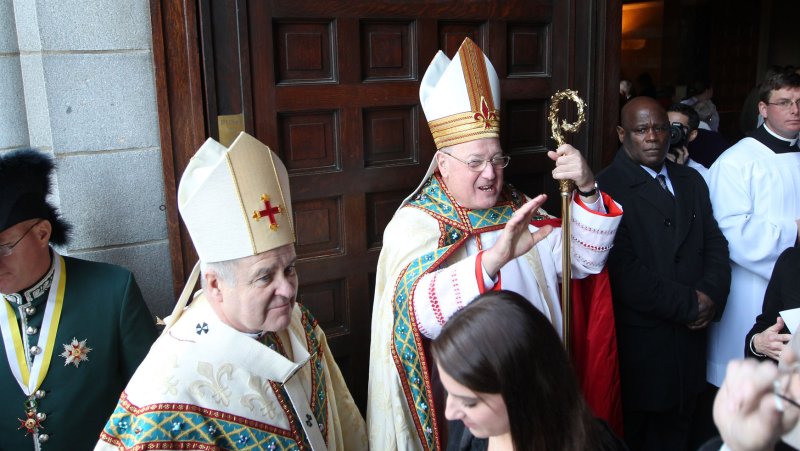Cardinal Timothy Dolan of New York (R) and St. Louis Archbishop Robert Carlson greet friends following the funeral of former St. Louis Cardinals and National Baseball Hall of Fame member Stan Musial at the Cathedral Basilica of St. Louis in St. Louis on January 26, 2013. Musial died at the age of 92 on January 19. UPI/Bill Greenblatt |
License Photo
VATICAN CITY, March 7 (UPI) -- U.S. cardinals at the Vatican bowed to pressure and imposed a media blackout ahead of the papal conclave to choose Benedict XVI's successor, a spokeswoman said.
"Concern was expressed in the General Congregation about leaks of confidential proceedings reported in Italian newspapers," Sister Mary Ann Walsh, the U.S. cardinals' spokeswoman, who had organized the news briefings, said in a statement.
"As a precaution, the cardinals have agreed not to do interviews," she said.
Her statement was released an hour before Wednesday's scheduled news conference with the U.S. cardinals.
The General Congregation of Cardinals is a daily meeting in which the cardinals get to know each other and discuss what they believe the church needs.
Wednesday's meeting included discussion about "the expectations and hopes of the next pope," Vatican spokesman the Rev. Federico Lombardi said.
The cardinals swore an oath of secrecy before the meetings, prohibiting them from discussing their contents.
Italian newspaper La Stampa has reported on comments it said individual cardinals made in the closed-door meetings.
A report Wednesday said the cardinals called for reforms of the Roman Curia -- the Vatican's administrative apparatus and the central governing body of the entire Catholic Church, together with the pope -- and asked for more information about the leaking of papal correspondence, a scandal known as VatiLeaks that engulfed the Vatican last year.
None of the comments published by La Stampa were blamed on the American briefings. Reporters said the U.S. cardinals were extremely careful in their briefings not to violate their vows of secrecy while at the same time explaining their thoughts on the selection process.
International news organizations, including United Press International, reported on the U.S. cardinals' briefings, as well as the expressed desire of cardinals from several countries to know more about the VatiLeaks scandal, even though Benedict decided last week the detailed dossier compiled by three cardinals would be shown only the next pope, not to the cardinals entering the conclave to choose him.
Some cardinals from other countries -- including Brazil, France and Germany -- also spoke to news organizations from their home countries.
The Vatican denied it pressured the U.S. cardinals to stay quiet.
But Lombardi stressed to reporters the pre-conclave meetings were secret, and Vatican spokesman the Rev. Tom Rosica, who often translates Lombardi's remarks into English, said the cardinals came to appreciate "the importance of keeping things among themselves."
On the VatiLeaks scandal report, Cardinal Sean Patrick O'Malley of Boston told reporters Tuesday he was "confident the cardinals will share information with one another."
The VatiLeaks scandal involved leaked Vatican documents purporting to expose alleged high-level corruption. The pope's butler was convicted of stealing papal correspondence and leaking them to an Italian journalist. He later received a papal pardon.
The internal Vatican investigation allegedly uncovered a network of gay prelates in the Vatican, some of whom, the report said, were blackmailed by outsiders, Italian newspaper La Repubblica reported two weeks ago.
The Vatican acknowledged last week it ordered wiretaps on the phones of some Vatican officials as part of the leaks investigation.
But Lombardi dismissed the idea that "an investigation that creates an atmosphere of fear and mistrust" would now affect the papal conclave.
That "has no foundation in reality," he said.
A date for the conclave has not been set. The church has until March 20 to start it.
Some 155 cardinals were expected to be at the Vatican Thursday, including all 115 cardinals expected to cast ballots for the next pope.
Cardinal Kazimierz Nycz of Warsaw, Poland, arrived late Wednesday and Cardinal Jean-Baptiste Pham Minh Man from Ho Chi Minh, Vietnam, was to arrive Thursday.
His arrival would mean the College of Cardinals was able to set a date to start the conclave. At that point, the 115 cardinal electors will be cut off from any communication with the outside world.















